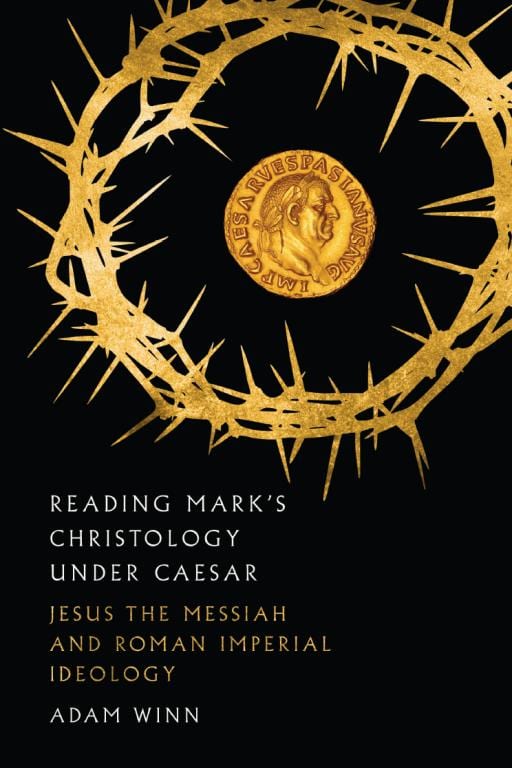 I read lots of books, but I can’t say I enjoy many of them. Well, Adam Winn’s new book, Reading Mark’s Christology under Caesar: Jesus the Messiah and Roman Imperial Ideology is an absolute pleasure. In this 2-part review, I will take this first post to summarize the book and explain why I like it so much. In the next part I offer my critical feedback.
I read lots of books, but I can’t say I enjoy many of them. Well, Adam Winn’s new book, Reading Mark’s Christology under Caesar: Jesus the Messiah and Roman Imperial Ideology is an absolute pleasure. In this 2-part review, I will take this first post to summarize the book and explain why I like it so much. In the next part I offer my critical feedback.
Summary
The application of postcolonial criticism and empire studies to the Synoptics has been going on for decades. In fact, it continues to be rather “trendy.” But most of the time it is done with rather vague thematic brushstrokes – an allusion or double-meaning here and there. Lots of speculation, no real purpose or historical grounding. In comes Winn. He applies a pretty impressive historical theory to the composition of Mark, and then lays out evidence within the text. Winn places the writing of Mark into the context of emperor Vespasian’s reign. In particular, Vespasian presented a certain imperial ideology of supremacy that included conquering of the Jewish people and destruction of the Jewish temple. Furthermore, there is some evidence that Vespasian claimed to fulfill Jewish messianic prophecies and expectations (or other claimed that about him)—Winn gives direct testimony about this from Josephus, Tacitus, and Suetonius (pp. 45-46). The implication of this for Christians would be the message that the “Jewish scriptures did not point to a Jewish Messiah but rather to the rise of the emperor Vespasian” (48). Winn argues that Mark wrote his Gospel in part to “set the record straight,” so to speak; thus, Mark’s Christology is central to his story, and one ought to read Mark within this wider political context.
With this backdrop in view, Winn gets to work showing how elements of Mark’s Gospel support his hypothesis – The Gospel as intentionally anti-Vespasian. Mark’s emphasis on the miracle-working wonders of Jesus would have a direct intention of one-upping the assumed miracles of Vespasian (see Winn’s ch. 3). Winn has a clever imperial-context solution to the Messianic Secret mystery as well. Like other kings and rulers of his time, Jesus was expected to resist excessive public honor, but he could (and did) accept public honor sometimes (see Winn’s ch. 5). And obviously the Temple incident is important to Winn’s theory. Why the Temple was destroyed was important for Flavian propoganda—and for Mark’s Gospel. Rather than this being a powerful act of Vespasian, Mark ensures Christians understand how this came about by the will of the one God who allowed Rome to sack the Temple “as a sign of divine favor on the Markan community, establishing it as the true dwelling place of God and divine power” (150).
Strengths
There are many strengths of Winn’s proposal. First and foremost he grounds it in history—especially the ancient testimonies of Vespasian’s supremacy. One can see how this might become central to Mark’s pastoral intentions. Secondly, Winn focuses this on the temple, a major feature of Jewish life, and a key symbol in early Christianity. Thirdly, Winn has done his Roman world homework and is able to find a number of fascinating connections between Jesus and Roman imperial ideology in continuity or contrast. And, perhaps most noticeably, Winn is a winsome and succinct writer offering clear information, helpful summaries, and explicating the relevance of connections he observes.
There are two types of academic studies – inductive and deductive. Most studies are inductive; they look at a theme or issue and draw out a variety of insights. Some studies are deductive – they develop a hypothetical solution to a problem and then amass evidence to support that theory. Winn’s book is deductive; he urges that Mark should be read as a response to imperial ideology, grounded in the ascension of Vespasian. He does a fine job of drawing together elements of imperial ethos and propaganda and then demonstrating how Mark’s Gospel, and specifically his Christology, is designed to counteract this. Again, he does not do this in a “hey aren’t these anti-imperial motifs interesting” sort of way; rather, he makes a case that Mark directly desired to subvert the emperor’s actual claims with his Gospel. This makes Winn’s book engaging and exciting!
When students ask me for good examples of deductive argumentation, Winn will serve as a great case study.
Having said all of that, I will also say that I am not sold on his theory (Yes, I can love a book without agreeing with its core thesis!). Be on the lookout for my next post to see why…











